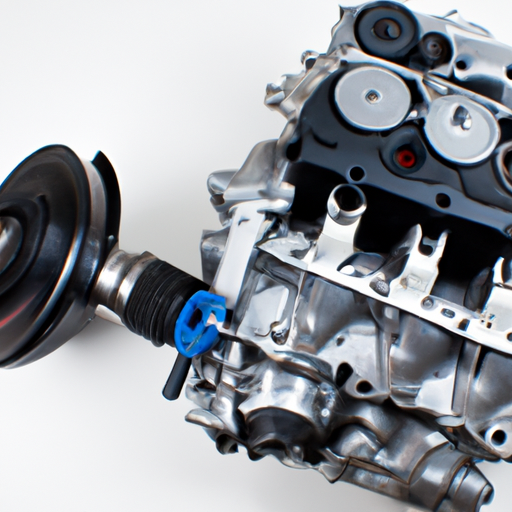Are you the proud owner of a BMW E36? If so, you may have encountered some frustrating starter issues with your vehicle. In this article, we will explore the common problems that BMW E36 owners often face with their starters. From slow cranking to complete failure, we will discuss the possible causes and potential solutions for these problems. So, if you’re looking for some insights into your BMW E36’s starter issues, keep reading to find out more!

Common BMW E36 Starter Problems
The BMW E36, a popular model among car enthusiasts, is known for its high performance and sleek design. However, like any vehicle, the BMW E36 can experience starter problems that can cause frustration and inconvenience for the owner. In this article, we will explore the common issues that E36 owners may face with their starters and provide solutions to these problems. Whether you are a DIY mechanic or simply want to understand the intricacies of your BMW E36, this comprehensive guide will serve as a valuable resource.
Overview of Starter Problems
The starter is an essential component of the BMW E36’s electrical system, responsible for initiating the engine’s combustion cycle. Unfortunately, over time, the starter can encounter various issues that prevent it from functioning properly. These problems can range from simple electrical glitches to more complex mechanical failures. Luckily, most starter problems can be diagnosed and resolved without needing to replace the entire unit.
Symptoms of Starter Problems
Identifying the symptoms of starter problems is crucial for diagnosing and resolving issues promptly. If you experience any of the following signs, it may indicate a problem with the starter:
No Start or Slow Start: One of the most common symptoms is the inability to start the engine or a slow cranking speed when attempting to start the vehicle. This can be accompanied by a clicking sound or no sound at all.
Intermittent Starting Issues: Your BMW E36 may start normally on some occasions but fail to start on others. This inconsistency can indicate a possible problem with the starter.
Grinding Noise: If you hear a grinding noise when attempting to start the vehicle, it may suggest an issue with the starter’s gear engagement mechanism.
Electrical Issues: Starter problems can also manifest through electrical issues, such as flickering dashboard lights or dim headlights when starting the engine.
Starter Solenoid Failure: Another symptom of starter problems is a faulty solenoid, which can cause a clicking sound when you turn the key in the ignition.
Causes of Starter Problems
Understanding the underlying causes of starter problems can help you prevent future issues and maintain the longevity of your BMW E36’s starter. Some common causes of these problems include:
Battery Issues: A weak or dead battery can strain the starter, leading to difficulty in starting the engine or complete failure of the starter.
Wear and Tear: The starter motor contains various moving parts that can wear out over time, such as the brushes, armature, and gears. This wear and tear can result in starter malfunctions.
Electrical Problems: Faulty wiring connections, damaged cables, or corroded terminals can disrupt the electrical flow to the starter, causing it to malfunction.
Ignition Switch Failure: A faulty ignition switch can prevent the starter from receiving the necessary signals to initiate the engine’s combustion cycle.
Diagnosing Starter Problems
Before diving into the solutions for BMW E36 starter problems, it is essential to diagnose the exact issue to ensure an accurate and effective repair. Here are the steps you can follow to diagnose starter problems in your E36:
Steps to Diagnose BMW E36 Starter Problems
Checking the Battery
Start by inspecting the battery for any signs of corrosion, loose connections, or a dead battery. Ensure that the battery terminals are clean and securely connected. You can use a multimeter to measure the battery’s voltage, ensuring it meets the manufacturer’s specifications.
Inspecting the Starter Motor
Next, examine the starter motor for any physical damage, such as cracks, leaks, or excessive wear. Inspect the brushes and the armature for signs of wear. If any parts appear damaged or worn out, it may be necessary to replace the starter motor.
Testing the Starter Relay
The starter relay plays a crucial role in the starting process. Use a multimeter to test the relay’s continuity and ensure it is functioning as intended.
Examining the Ignition Switch
A faulty ignition switch can prevent the starter from receiving the necessary signals to start the engine. Inspect the ignition switch for any signs of damage or malfunction. Replace the ignition switch if necessary.
Verifying the Wiring Connections
Finally, inspect all wiring connections related to the starter, including the ground wire, to ensure they are secure and free from damage or corrosion. Any loose or damaged wiring connections should be repaired or replaced.
By following these diagnostic steps, you can identify the specific cause of the starter problem in your BMW E36 and move forward with the appropriate solutions.
Solutions to BMW E36 Starter Problems
Once you have diagnosed the starter problem in your BMW E36, it’s time to explore the various solutions available to resolve the issue. Here are some common solutions to BMW E36 starter problems:
Jump-Starting the Car
If the starter problem is due to a weak or dead battery, jump-starting the car can provide a temporary solution. Use jumper cables to connect the BMW E36’s battery to another vehicle’s battery or a battery booster pack. This will provide the necessary power to start the engine.
Starter Motor Replacement
If the starter motor is worn out or damaged beyond repair, replacing it with a new one may be necessary. Ensure you purchase a high-quality starter motor that is compatible with your BMW E36’s model and year.
Starter Relay Replacement
A faulty starter relay can prevent the starter from receiving the electrical signals required to start the engine. Replace the starter relay with a new one to restore proper functionality.
Ignition Switch Replacement
If the ignition switch is malfunctioning and not sending the necessary signals to the starter, you may need to replace it. Consult the BMW E36’s service manual or seek professional assistance to replace the ignition switch correctly.
Repairing Faulty Wiring
If the issue lies with damaged or corroded wiring connections, repairing or replacing the faulty wiring is necessary. Ensure you properly secure and insulate the new wiring connections to prevent future problems.
Preventive Measures for BMW E36 Starter Problems
While it’s essential to know how to diagnose and resolve starter problems, taking preventive measures can minimize the risk of encountering these issues in the first place. Here are some preventive measures to keep your BMW E36 starter in good working condition:
Regular Battery Maintenance
Check and clean the battery terminals regularly to prevent the buildup of corrosion. Additionally, ensure the battery is adequately charged and consider replacing it when necessary.
Keeping the Starter Motor Clean
Regularly inspect and clean the starter motor to remove any debris or dirt that may affect its performance. A clean starter motor is less likely to encounter problems.
Maintaining the Ignition System
Routine maintenance of the ignition system, including the ignition switch and starter relay, can help prevent starter problems. Ensure all components are functioning properly and replace any faulty parts promptly.
Checking Wiring Regularly
Inspect the wiring connections related to the starter regularly. Look for signs of damage, loose connections, or corrosion. Address any issues immediately to prevent potential starter malfunctions.
By implementing these preventive measures, you can prolong the lifespan of your BMW E36’s starter and minimize the likelihood of encountering starter problems.

Common Misdiagnoses of BMW E36 Starter Problems
Despite your best efforts, there may be instances where starter problems are misdiagnosed, leading to ineffective repairs. Understanding these common misdiagnoses can help you avoid unnecessary expenses and time-consuming repairs. Here are some common misdiagnoses of BMW E36 starter problems:
Faulty Starter Motor Diagnosis
Misjudging a faulty starter motor as a different issue, such as a battery problem or an electrical fault, can lead to ineffective repairs. It is crucial to thoroughly inspect the starter motor before ruling out its failure.
Incorrect Battery Evaluation
A weak or dead battery can mimic the symptoms of a starter problem. Assessing the battery incorrectly and replacing the starter motor instead can result in unnecessary expenses.
Wrong Starter Relay Assessment
The starter relay plays a significant role in the starting process. Misdiagnosing a faulty starter relay as a different issue may result in ineffective repairs. Always test the starter relay before replacing other components.
Misdiagnosis of Ignition Switch
Failing to identify a faulty ignition switch correctly can lead to unnecessary replacement of other starter components. Thoroughly inspect the ignition switch before pursuing other repair options.
Overlooking Wiring Issues
Neglecting to inspect the wiring connections related to the starter can result in misdiagnosis. Always ensure the wiring is in good condition and securely connected before replacing other starter components.
By avoiding these common misdiagnoses, you can save time, money, and frustration when dealing with BMW E36 starter problems.
Tips for Dealing with BMW E36 Starter Problems
Dealing with starter problems can be overwhelming, especially for those who are not familiar with automotive repairs. Here are some tips to help you navigate through BMW E36 starter problems:
Consulting a Professional Mechanic
If you are unsure of your mechanical abilities or lack the necessary tools, it is advisable to consult a professional mechanic. They have the expertise and experience to diagnose and resolve starter problems efficiently.
Using Quality Replacement Parts
When replacing any starter components, ensure you use high-quality replacement parts. These parts are more likely to offer better longevity and performance compared to cheaper alternatives.
Following Proper Maintenance Schedule
Adhering to the recommended maintenance schedule for your BMW E36 can help prevent starter problems and other issues. Regularly servicing your vehicle will ensure all components are in good working condition.
Keeping Track of Electrical System Performance
Pay attention to any changes in your BMW E36’s electrical system, such as dimming lights or flickering dashboard lights. These may indicate potential starter problems. Timely intervention can prevent further complications.
By following these tips, you can effectively manage and resolve BMW E36 starter problems, minimizing the impact on your daily life.

Cost of Repairing BMW E36 Starter Problems
Understanding the potential costs associated with repairing BMW E36 starter problems can help you budget accordingly. The overall cost will depend on various factors, including the extent of the problem, labor rates, and the specific replacement parts required. Here is a breakdown of the potential costs:
Estimated Labor Costs
The labor costs for repairing BMW E36 starter problems can range from $100 to $300, depending on the complexity of the repair and the hourly rate of the mechanic.
Replacement Parts Expenses
The cost of replacement parts will vary depending on the component that needs to be replaced. On average, starter motor replacements can range from $200 to $500, while ignition switch replacements can cost around $150 to $300.
Additional Diagnostic Fees
In some cases, additional diagnostic fees may be incurred if there are multiple issues with the starter or other related components. These fees can range from $50 to $100.
Keep in mind that these costs are estimates and can vary depending on your location, the mechanic you choose, and the availability of replacement parts.
Warranty Coverage and Extended Protection Plans
With the complexities of modern vehicles, having warranty coverage or extended protection plans can provide peace of mind and financial security. Here is some information regarding warranty coverage and extended protection plans for the BMW E36:
BMW E36 Factory Warranty
The BMW E36 may still be covered by the manufacturer’s factory warranty if it is within the specified time or mileage limits. Factory warranties typically cover defects in material or workmanship for a certain period or mileage, but they may not cover wear and tear or failures caused by neglect or accidents.
Extended Protection Plans
If your BMW E36 is no longer covered by the factory warranty, considering an extended protection plan can be beneficial. Extended protection plans provide coverage beyond the factory warranty and can help cover the costs of repairs. Be sure to carefully review the terms and conditions of the plan before purchasing to ensure it meets your needs.
Considerations for Warranty Claims
If you encounter starter problems while your BMW E36 is still under warranty, it is essential to follow the manufacturer’s guidelines for warranty claims. This typically involves contacting an authorized BMW dealership or service center for repairs.

FAQs about BMW E36 Starter Problems
To provide additional information and address common concerns, here are some frequently asked questions about BMW E36 starter problems:
How long do BMW E36 starter motors typically last?
BMW E36 starter motors can generally last between 80,000 to 150,000 miles, depending on various factors such as driving conditions, maintenance, and overall usage. However, premature failure can occur due to issues like wear and tear or electrical problems.
Can a bad battery cause starter problems?
Yes, a bad or weak battery can strain the starter and cause starting problems. The starter relies on a sufficient power supply from the battery to initiate the engine’s combustion cycle. If the battery is unable to provide the necessary power, it can hinder the starter’s functionality.
What are the signs of a faulty starter relay?
Signs of a faulty starter relay include a clicking sound when attempting to start the engine, intermittent starting issues, or the engine not starting at all. In some cases, the starter may rotate slowly or fail to rotate altogether.
Is it possible to repair a BMW E36 starter motor?
In some cases, minor issues with the starter motor, such as worn-out brushes or a faulty solenoid, can be repaired. However, significant mechanical or electrical failures often require replacing the entire starter motor.
What should I do if my BMW E36 won’t start?
If your BMW E36 won’t start, start by checking the battery for any signs of damage or a weak charge. Ensure the battery terminals are clean and securely connected. If the battery is in good condition, proceed with diagnosing the starter system to identify the problem.
Conclusion
BMW E36 starter problems can be frustrating, but with the right knowledge and approach, they can be resolved efficiently. By understanding the common issues, diagnosing the problem accurately, and implementing appropriate solutions, you can keep your BMW E36’s starter in optimal condition. Remember to follow preventive measures, consult professionals when needed, and stay proactive in maintaining the electrical system. With the tips provided in this comprehensive guide, you can confidently tackle BMW E36 starter problems and keep your vehicle running smoothly.

